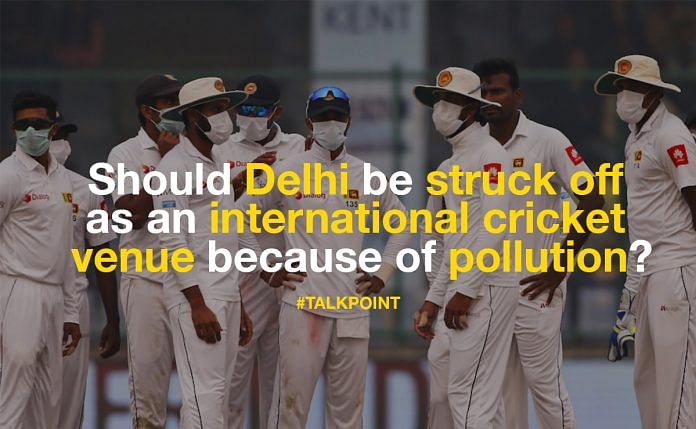ThePrint asks:
Should Delhi be struck off as an international cricket venue because of pollution?
The capital city of Delhi resembles a bustling metropolis sans a robust health and civic standard of living. According to an RTI query, the Government of Delhi was able to spend only Rs 93 lakh of the Rs 787 crore environment cess it had collected.
All this while the smog engulfed Delhi forcing offices and schools to close, turning the city into a gas chamber. Facing protests and media outcry, Delhi Chief Minister Arvind Kejriwal took the easy route, by announcing that his government would utilise this money to purchase 500 electric buses and 1000 CNG buses. Following this, the Delhi High Court observed that the plan to purchase buses had been pending for a long time and questioned the need to divert environment funds for bus purchase.
While a solution to this mess seems unlikely in the near future, one must ask whether Delhi is fit to host international games in such nauseous conditions?
As a cricket fan, I wonder what were the compulsions for the BCCI, led by the Supreme Court-appointed CoA, and DDCA, led by Justice Sen to pick Delhi as a host venue. Did they overlook the health of players, or was it a lack of understanding of the requisite playing conditions for an international match?
Read other perspectives on the smog affecting Sri Lanka vs India test match:
Ayaz Memon, sportswriter
Sheila Dikshit, former chief minister of Delhi
The simplest way out is not to hold matches for that particular month. But we must be selective, and not include all venues in northern India, like the way it was done for the fog.
State governments play an important role in the success of a host venue; when we work together, the country wins. But I fear the ongoing list of follies by the BCCI will only continue, player interests will be overlooked, and fans will get short changed. Credibility and respect of the Board has taken a hit, both internationally as well as at home.
Most recently the U-19 Women’s Cricket matches between Manipur and Nagaland, Nagaland and Kerala have once again raised the question whether these states should be given sweeping rights within the Board without first nurturing their game, players, and infrastructure.
Indian cricket is going through turbulent times and is trying to bounce back from one googly or the other. But as long as the pitch is not made better, you can’t blame the bowler or batsmen.
That’s why I ask: What has really changed by appointing retired judges and officials ?
Anurag Thakur is former president of BCCI.






